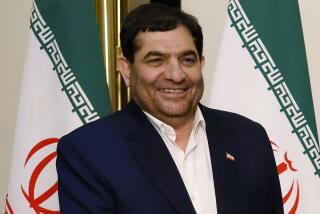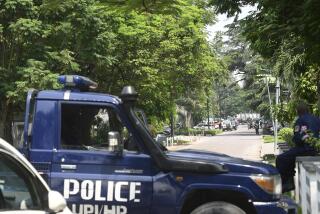Clemency Inquiry Rooted in Jewish Town
For more than four decades, this community of Hasidic residents has lived a reclusive existence far removed from the malls and subdivisions surrounding the village north of New York City. TV sets and newspapers are banned here. So are shorts, T-shirts and bathing suits.
Signs in Yiddish advise men and women to walk on different sides of the road. As mothers shepherd children through snowy streets, their fathers, husbands and sons spend hours poring over holy texts.
But this village that deliberately shut out the modern world also is the home of a sophisticated scam that bilked $40 million from the federal government to support civic and spiritual enterprises. And ever since then-President Clinton commuted prison sentences for four local men who engineered the fraud, the town that overwhelmingly backed Hillary Rodham Clinton’s U.S. Senate bid has been caught up in scandal.
The U.S. attorney in New York City has launched a probe to determine whether there was a deal that swapped votes for the reduced sentences, and last week FBI agents began interviewing residents, further deepening the anxiety in New Square. Prosecutors also have subpoenaed county Democratic Party records as part of the inquiry, and some New York politicians are calling for a congressional probe.
“I’d say the mood here is one of exasperation, because nobody has offered proof that there was a deal to trade votes for pardons,” said Rabbi Mayer Schiller, a town spokesman. “Nobody got rich here. The men convicted used the money to support local schools and, while they might have violated the letter of the law, they didn’t think they violated the spirit of the law.”
Prosecutors have protested the commutations, saying they send the wrong message to other groups contemplating similar fraud. And many observers have challenged Hillary Clinton’s contention that she had nothing to do with her husband’s commutation decision.
The New Square furor had its roots in her visit here in August, a time when her Senate campaign was in hot water with Jewish voters over her earlier embrace of a Palestinian state. She needed a show of support from the state’s politically potent Orthodox Jewish community and, with great fanfare, the first lady toured the village. The climax was an audience with Grand Rebbe David Twersky, the town’s spiritual leader.
Hillary Clinton has said repeatedly that neither she nor Twersky discussed the four imprisoned men during the meeting, an account supported by several witnesses. In November, the town voted for her, 1,400 to 12, unlike two neighboring Orthodox communities that voted heavily for her Republican opponent. The president and first lady invited Twersky to visit the White House on Dec. 22, and at that meeting, she said, the rabbi lobbied the president to reduce the sentences.
“I’ve said all I’m going to say about the matter,” Sen. Clinton said last week, reiterating that she knew nothing about the commutation request nor does she have an opinion about it now. In a Marist College poll last month, 46% of New Yorkers said they didn’t believe her explanation, while 37% did.
Even some of Hillary Clinton’s strongest supporters are skeptical. Former Mayor Edward I. Koch said Hasidic leaders know how to flex political muscle and “are never shy about asking for what they want.” Questions about what Sen. Clinton knew and when have grown amid reports that New Square leaders approached New York Mayor Rudolph W. Giuliani months before the meeting with her. Community leaders offered to support Giuliani’s then-active Senate campaign against the first lady if he would support the bid for reduced sentences--an offer that Giuliani refused, according to a source familiar with the mayor’s campaign.
“The New Square story shows you that, even though this town might seem very exotic, its residents are really no different than other people,” said J.J. Goldberg, editor of Forward, a weekly Jewish newspaper. “They wanted government assistance for their town, and they figured out how to work the system for their own gain. The problem was, they got caught.”
19th Century Model
A town of modest, sometimes ramshackle houses and apartments, New Square was founded in 1956 by Grand Rebbe Joseph Twersky (David Twersky’s father) from the Ukraine. It was the nation’s first all-Orthodox Jewish village, modeled along the lines of a 19th century Russian shtetl. The sexes are segregated in public, and residents mingle as little as possible with American culture, which is thought to be profane.
Although some people are employed, most try to observe a strict Hasidic lifestyle. As a result, the 7,000-member community has traditionally sought government funding to stay alive, Goldberg noted.
More than 60% of residents live below the poverty line, according to federal data, yet the town is rich in another sense: Its leaders have historically delivered huge blocs of votes to supportive politicians, in the past giving equally lopsided votes to New York Gov. George Pataki, a Republican, and U.S. Sen. Charles E. Schumer, a Democrat.
But there are limits to political largess: Although New Square’s life is centered on its yeshiva--a school for Talmudic studies--there is a federal ban on aid to such religious institutions. And this was the seed of the fraud that took root in the small village in the early 1980s. Unable to get conventional funding for its yeshiva and other local schools, a handful of men connected to the town’s village council tapped into a gold mine of federal programs.
During a 1999 trial, prosecutors said that hundreds of New Square residents had received thousands of dollars in federal grants to attend a fictitious school based in Brooklyn. Meanwhile, newly arrived Russian immigrants received $300 payments to sign up for nonexistent courses in local schools with teachers who didn’t exist. Similar schemes were hatched with small-business loans and rental subsidies from federal housing programs, enabling organizers to fund the yeshiva and other facilities until the fraud was halted in 1992.
Although they claimed to have simply misunderstood federal regulations, four residents were convicted of funneling federal money into the New Square yeshiva and other schools, bank accounts and, in some cases, the pockets of the organizers. U.S. District Judge Barbara Jones said the men had masterminded a scheme that was “sophisticated, long-term and brazen in its execution.”
Two other New Square men were indicted, but they fled to Israel in 1997. Chaim Berger--a town political elder and alleged architect of the fraud--is fighting extradition to the United States.
‘Religious Persecution’
In his Jan. 20 commutation, President Clinton reduced the sentences of Kalman Stern, Jacob Elbaum, Benjamin Berger (Chaim’s son) and David Goldstein from a maximum of 78 months to a maximum of 30 months. Attorneys said that the men, who remain in custody, are remorseful and that their large families are suffering.
The town has grieved with them.
“Many people feel that there was a sense of religious persecution here, because what the men did was a misunderstanding, not a crime,” said one woman, who like many residents spoke on the condition that her name be withheld. “This village has no crime and no drugs. So I ask, what happened here that was so very terrible?”
The New Square case was similar to others in ultra-Orthodox Jewish communities probed by federal investigators during the early 1990s. During a 1993 U.S. Senate hearing, witnesses cited 37 instances in which groups were using federal funds illegally. Most cases were settled through negotiation, but New Square landed in court.
“I’ll tell you why,” said a prominent town figure, who asked not to be identified. “The feds got fed up, because at the initial stages of the investigation, people here were very uncooperative. The government was really annoyed at the scale of the fraud and the kind of resistance they encountered.”
When FBI agents drove into town to serve subpoenas in 1995, they were surrounded by several motorists who threatened them and forced them to leave. When agents returned with a police escort, they were followed by a car with a loudspeaker blaring instructions in Yiddish and urging residents not to cooperate. The next year, after a federal court had failed to get financial records from the New Square yeshiva, a judge forced the school into receivership and levied a $1-million fine.
Authorities later determined that the defendants had signed up many residents for Pell education grants beginning in the early 1980s. These stipends of up to $2,500, which do not have to be repaid, are designed to further a student’s college education and help develop career skills.
The scam had escaped major scrutiny until auditors visiting New Square in 1992 grew suspicious. Brian Hickey, a veteran investigator with the Department of Education, triggered a wide-ranging probe after he asked to inspect financial records. He was kept waiting for hours, he later testified, before finally inspecting documents that seemed to be freshly typed. When he asked one Pell grant recipient when she expected to graduate, she answered, “You mean, from high school?”
Hickey and other auditors decided to go door-to-door to see whether students were taking college-level courses. They discovered widespread fraud: Abraham Berkowitz, who testified under a grant of immunity, said he and the defendants regularly posed as school administrators for the fictitious Brooklyn school and rehearsed their roles before auditors arrived. Two women who got Pell grants for 14 and 11 years, respectively, could not recall what they had studied.
One student, asked what she learned in biology, said she had been trained to prepare kosher meat. Another woman, told her husband had been enrolled in rabbinical courses for six years, testified that he actually was a limousine driver from Teaneck, N.J. “If he’d taken all of these classes,” she said angrily, “he’d have been a rabbi by now.”
The town was stung by these revelations, but the widening U.S. attorney’s probe now has people on edge, Rabbi Schiller said.
Last week, federal agents began interviewing several politicians present at the August meeting between Rabbi David Twersky and then-candidate Hillary Clinton. One of them, state Assemblyman Samuel Colman, a Democrat who has represented New Square for 17 years, said that no political quid pro quo was brought up.
“It was all very gracious, very polite,” he said. “I can’t believe anyone would be so gullible to think these two people would strike a deal over 1,400 votes. The whole thing has been blown out of proportion.”
Indeed, many residents insist that the fraud case is unlike other crimes because the New Square scheme wasn’t about personal greed. “The defendants had a greater good in mind--the idea of supporting their neighbor and doing public good,” said attorney Gerald Shargel, who briefly represented the town.
Yet others scoff, saying Judaism frowns on dishonesty in business dealings and has no place for such chicanery. The New Square financial scam “was trying to create in America, by criminal means, a system of state welfare for religious schools,” said Samuel G. Freedman, author of “Jew vs. Jew: The Struggle for the Soul of American Jewry.” “In this country, that’s a flat-out crime.”
More to Read
Start your day right
Sign up for Essential California for news, features and recommendations from the L.A. Times and beyond in your inbox six days a week.
You may occasionally receive promotional content from the Los Angeles Times.






